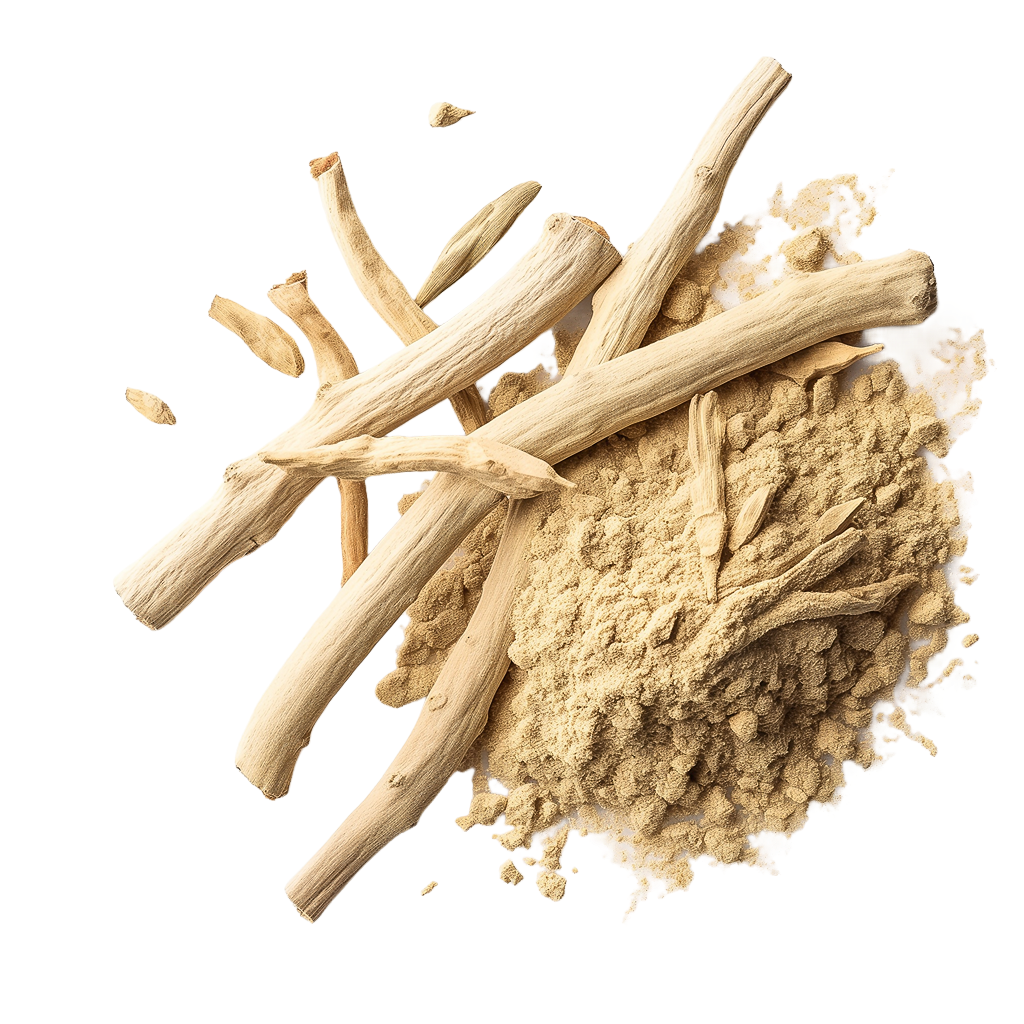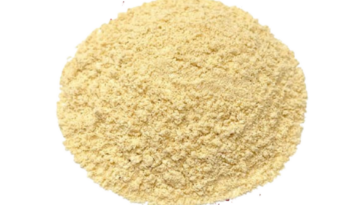Ashwagandha, scientifically known as Withania somnifera, is an ancient medicinal herb native to India and North Africa. Its use dates back thousands of years in Ayurvedic medicine, one of the world’s oldest holistic healing systems. The Sanskrit name “Ashwagandha” translates to “smell of horse,” indicating both its distinct odor and its traditional belief that consuming the herb can impart the strength and vitality of a horse.
Traditionally, Ashwagandha root powder has been used to alleviate stress, anxiety, and fatigue, as well as to enhance physical endurance and cognitive function. It’s classified as an adaptogen, meaning it helps the body manage stress and maintain balance. Over the years, its popularity has grown globally, with modern research supporting many of its traditional uses. Today, Ashwagandha is commonly consumed in various forms, including capsules, extracts, and as a powder, prized for its potential health benefits and adaptogenic properties.
Vitamins & Minerals:
Ashwagandha, also known as Withania somnifera, is a popular herb in Ayurvedic medicine renowned for its adaptogenic properties. While it primarily contains alkaloids and withanolides, it also contains a variety of vitamins and minerals that contribute to its health benefits.
- Iron: Ashwagandha root powder contains iron, a crucial mineral involved in the production of red blood cells and oxygen transport in the body. Iron deficiency can lead to fatigue, weakness, and compromised immune function. By supplementing iron through Ashwagandha, individuals may experience increased energy levels and improved vitality.
- Calcium: Calcium is essential for maintaining strong bones and teeth, as well as supporting muscle function and nerve transmission. Ashwagandha contains a modest amount of calcium, contributing to overall bone health and potentially aiding in the prevention of osteoporosis and other bone-related disorders.
- Vitamin C: Ashwagandha root powder also contains vitamin C, a powerful antioxidant that supports immune function, collagen production, and iron absorption. Vitamin C plays a crucial role in protecting cells from oxidative stress and reducing the risk of chronic diseases.
- Vitamin E: Another antioxidant found in Ashwagandha is vitamin E, which helps protect cells from damage caused by free radicals. It also supports immune function and skin health, promoting overall well-being and vitality.
- B-vitamins: Ashwagandha contains various B-vitamins, including B1 (thiamine), B2 (riboflavin), and B6 (pyridoxine). These vitamins play essential roles in energy metabolism, nerve function, and the production of neurotransmitters. Adequate intake of B-vitamins is crucial for maintaining overall health and well-being.
- Magnesium: Magnesium is involved in over 300 biochemical reactions in the body, including muscle and nerve function, energy production, and bone health. Ashwagandha root powder contains magnesium, which may help support relaxation, reduce stress, and improve sleep quality.
In summary, Ashwagandha root powder contains a variety of vitamins and minerals that contribute to its adaptogenic and health-promoting properties. These nutrients, including iron, calcium, vitamin C, vitamin E, B-vitamins, and magnesium, play essential roles in energy metabolism, immune function, antioxidant defense, and overall well-being. Incorporating Ashwagandha into one’s diet may help support optimal health and vitality.
Probiotic, Prebiotic, or Postbiotic:
Ashwagandha powder, derived from the roots of the Ashwagandha plant (Withania somnifera), is not typically classified as a probiotic, prebiotic, or postbiotic. However, it does offer various health benefits, some of which indirectly support gut health.
- Probiotic: Probiotics are live microorganisms that confer health benefits when consumed in adequate amounts. Ashwagandha powder itself doesn’t contain live microorganisms, so it isn’t a probiotic. However, by supporting overall health and potentially reducing stress, it may indirectly support the growth and maintenance of beneficial gut bacteria.
- Prebiotic: Prebiotics are substances that promote the growth or activity of beneficial microorganisms, such as bacteria and fungi, in the gut. While Ashwagandha powder doesn’t fit the typical definition of a prebiotic, some research suggests that it may have prebiotic-like effects. Studies have shown that it can enhance the growth of certain beneficial gut bacteria, although more research is needed to confirm this effect.
- Postbiotic: Postbiotics are the metabolic byproducts of probiotic bacteria or other microorganisms that confer health benefits. Ashwagandha powder itself isn’t a postbiotic, but its consumption may lead to changes in the gut microbiota composition, which could result in the production of certain postbiotic compounds. These compounds could potentially contribute to gut health indirectly.
In summary, while Ashwagandha powder isn’t classified as a probiotic, prebiotic, or postbiotic in the traditional sense, it may still have some beneficial effects on gut health through its various mechanisms of action, including reducing stress, inflammation, and oxidative stress, which can indirectly support a healthy gut microbiota. However, more research is needed to fully understand its impact on gut health and its interaction with the gut microbiota.
Dietary & Health Information:
Ashwagandha, also known as Withania somnifera, is a popular herb in Ayurvedic medicine renowned for its potential health benefits. While it’s generally considered safe for most people when taken in appropriate doses, it’s essential to be mindful of certain factors when incorporating ashwagandha powder into your diet.
- Dietary Information:
- Nutritional Profile: Ashwagandha root powder is a rich source of various bioactive compounds, including alkaloids, steroidal lactones (withanolides), and flavonoids. However, it’s not typically consumed for its nutritional content but rather for its medicinal properties.
- Dosage Forms: Ashwagandha is commonly available in powder, capsule, or liquid extract forms. The powder form is versatile and can be easily mixed into smoothies, beverages, or sprinkled over food.
- Health Information:
- Stress Reduction: One of the most well-known benefits of ashwagandha is its potential to reduce stress and anxiety. It’s believed to modulate the body’s stress response by regulating cortisol levels.
- Improvement in Cognitive Function: Some studies suggest that ashwagandha may enhance memory, cognitive function, and overall brain health.
- Anti-inflammatory Properties: Ashwagandha exhibits anti-inflammatory properties, which may benefit individuals with inflammatory conditions like arthritis.
- Boosting Immunity: It’s believed to have immune-boosting effects, helping the body fight off infections and illnesses.
- Potential for Lowering Blood Sugar Levels: Research indicates that ashwagandha may help lower blood sugar levels by improving insulin sensitivity, making it potentially beneficial for individuals with diabetes or those at risk of developing the condition.
- Dosage and Safety:
- Recommended Dosage: The appropriate dosage of ashwagandha powder can vary depending on factors such as age, health status, and the specific health goals of the individual. However, a typical dosage range for ashwagandha powder is 300 mg to 500 mg, taken one to two times per day.
- Maximum Daily Intake: While ashwagandha is generally safe for most people when taken within the recommended dosage range, it’s essential not to exceed the maximum daily intake. Excessive consumption may lead to gastrointestinal discomfort or other adverse effects.
- Consultation: It’s advisable to consult with a healthcare professional, particularly if you have underlying health conditions, are pregnant or nursing, or are taking medications, to determine the appropriate dosage and ensure ashwagandha is safe for you.
In summary, ashwagandha powder offers numerous potential health benefits, ranging from stress reduction to immune support and improved cognitive function. However, it’s crucial to consume it responsibly within the recommended dosage range and under the guidance of a healthcare provider to maximize its benefits and minimize any potential risks.




 No products in the cart.
No products in the cart.